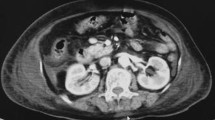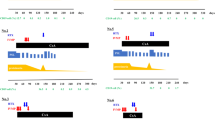Abstract
Treatment with a single dose of rituximab alone induced remission in a patient with relapsed minimal change nephrotic syndrome (MCNS). A 27-year-old man was given corticosteroid (prednisolone; PSL) and cyclosporine (CyA) therapy combined with rituximab for his fifth relapse in 2008. Thereafter, complete remission was achieved and maintained despite eventual discontinuation of the PSL and CyA. In 2010, we treated his sixth relapse with a single dose of rituximab. Complete remission was obtained 32 days later. This is the first report of rituximab monotherapy in the treatment of MCNS.

Similar content being viewed by others
References
Cunard R, Kelly CJ. T cells and minimal change disease. J Am Soc Nephrol. 2002;13:1409–11.
François H, Daugas E, Bensman A, Ronco P. Unexpected efficacy of rituximab in multirelapsing minimal change nephrotic syndrome in the adult: first case report and pathophysiological considerations. Am J Kidney Dis. 2006;49(1):158–61.
Sawara Y, Itabashi M, Kojima C, Tabata H, Kamei D, Kawanishi K, et al. Successful therapeutic use of a single-dose of rituximab on relapse in adults with minimal change nephritic syndrome. Clin Nephrol. 2009;72:69–72.
Benz K, Dotsch J, Rascher W, Stachel D. Change of the course of steroid-dependent nephrotic syndrome after rituximab therapy. Pediatr Nephrol. 2004;19:794–7.
Pescoviz MD, Book BK, Sider RA. Resolution of recurrent focal segmental glomerulosclerosis proteinuria after rituximab treatment. N Engl J Med. 2006;354:1961–3.
Gilbert RD, Hulse E, Rigden S. Rituximab therapy for steroid-dependent minimal change nephrotic syndrome. Pediatr Nephrol. 2006;21:1698–700.
Smith GC. Is there a role for rituximab in the treatment of idiopathic childhood nephrotic syndrome? Pediatr Nephrol. 2007;22:893–8.
Guigonis V, Dallocchio A, Baudouin V, Dehennault M, Hachon-Le Camus C, Afanetti M, et al. Rituximab treatment for severe steroid- or cyclosporine-dependent nephrotic syndrome: a multicentric series of 22 cases. Pediatr Nephrol. 2008;23:1269–79.
Mansour H, Cheval L, Elalouf JM, Aude JC, Alyanakian MA, Mougenot B, et al. T-cell transcriptome analysis points up a thymic disorder in idiopathic nephrotic syndrome. Kidney Int. 2005;67:2168–77.
Yap HK, Cheung W, Murugasu B, Sim SK, Seah CC, Jordan SC. Th1 and Th2 cytokine mRNA profiles in childhood nephrotic syndrome: evidence for increased IL-13 mRNA expression in relapse. J Am Soc Nephrol. 1999;10:529–37.
Johnson RJ, Hurtado A, Merszei J, Rodriguez-Iturbe B, Feng L. Hypothesis: dysregulation of immunologic balance resulting from hygiene and socioeconomic factors may influence the epidemiology and cause of glomerulonephritis worldwide. Am J Kidney Dis. 2003;42:575–81.
Author information
Authors and Affiliations
Corresponding author
About this article
Cite this article
Amemiya, N., Takei, T., Kojima, C. et al. Induction of remission following a single dose of rituximab alone in a patient with minimal change nephrotic syndrome. Clin Exp Nephrol 15, 933–936 (2011). https://doi.org/10.1007/s10157-011-0510-5
Received:
Accepted:
Published:
Issue Date:
DOI: https://doi.org/10.1007/s10157-011-0510-5




